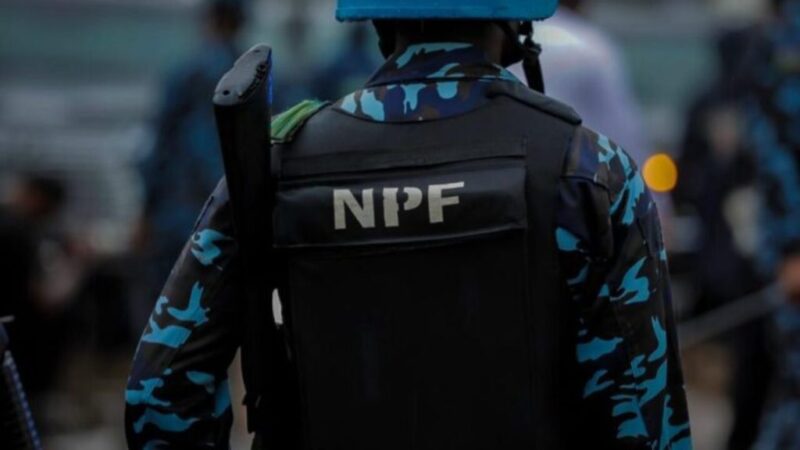Ex-NAICOM Commissioner Kari writes regulators, warns against registering police insurance coy

Police
Ex-NAICOM Commissioner Kari writes regulators, warns against registering police insurance coy
Nike Popoola
A former Commissioner for Insurance, National Insurance Commission (NAICOM), Mr. Mohammed Kari, has raised an objection to the registration of NPF Insurance Company.
He expressed his opposition to the registration in a letter written to the National Insurance Commission, titled, ‘Registration of the NPF Insurance Company-An objection’, dated July 25, 2024, which was obtained by Dailyeconomy on Monday.
In the letter, the former commissioner copied the Honourable Minister of Finance; Chairman, National Insurance Commission; Chairman, Senate Committee on Banking, Insurance and Others Financial Institutions; Chairman, House Committee on Insurance and Actuarial Matters; Director General, Bureau for Public Enterprises; and Chairman, Nigerian Insurers Association.
He said his objection was based on several critical concerns that he believes warrant serious consideration.
Kari, who was an active player in the Nigerian Insurance industry from 1979 to 2023, was the Managing Director/Chief Executive officer of Nigeria Reinsurance Corporation and NICON Insurance Plc, and later the Commissioner for Insurance/Chief Executive of National Insurance Commission (NAICOM).
He stated, “I was also a consultant in the sector in between these offices. I had the benefit of being an Insurer to Nigeria Police Force (NPF), a reinsurer to their insurance providers and of course a regulator of the whole industry.”
Expressing his concerns over the registration, the former commissioner said, “The core operations of the Nigeria Police Force are fundamentally at odds with commercial activities. The primary mandate of the Police is to maintain law and order, not to engage in business ventures. Allowing the Police to operate an insurance company could lead to conflicts of interest and distract from their essential duties. The Police is a regulator of sorts, they cannot be enforcing the law on compulsory insurance and be a provider of Insurance. The temptation to force motorist to insure with their company will be irresistible.
“The structure and ownership requirements stipulated by Nigerian insurance laws and Financial Reporting Council necessitate a level of expertise that is currently lacking within the nominated Board of Directors and the Police force. Another requirement is a spread in ownership to avoid undue influence on the company by one shareholder. The authoritative nature of the police and their potential representation on the Board of Directors could lead to undue interference in the management of the insurance company, compromising its independence and effectiveness.
“The Nigeria Police Force Investments have a history of mismanagement, as evidenced by the numerous issues surrounding the Nigeria Police Pension Scheme. This history raises significant doubts about the ability of the Police to effectively manage an insurance company, which requires a high level of expertise and know-how.
“The fragmentation of the insurance business would result in the loss of valuable data and income for the industry. The entry of the Nigeria Police into the insurance market could disrupt the existing ecosystem, leading to inefficiencies and potential data loss that could harm the overall industry.
“In case they are floating the idea of a captive, I don’t believe the Nigeria Police Force has enough business spread or expertise to support the survival of a captive company neither do they have the reputation to attract independent business. This would expose public funds to unwarranted loss.
“The command-and-control nature of the Police force would make them take offence of a caution by a regulator. I don’t see how the Police can operate under someone’s regulation, for they would not accept commercial directive, and neither would they observe regulatory control. It would compromise the authority of the regulator if one company is seen to ignore regulatory control or out rightly disregard them, the regulator would lose his authority to regulate the market.
“When I was an operator and their Insurer, the NPF as a consumer had detained a Head of Department and I, the CEO when we rejected to pay for a loss that was not insured on their policy. Can the CEO of an NPF Insurance Company refused to pay any demand of his owners, whether insured or not?
“When I was a regulator, the NPF as a consumer, have requested on many occasions to obtain waivers to bypass the Nigerian Insurance Industry to place their businesses directly abroad, and on all occasions, we have refused them. (These requests were made against the advice of their Broker and Insurer) I can just imagine what they would do as a registered Insurance Company.
“Approving this application could set a concerning precedent. It may encourage other government agencies, such as the Federal Road Safety Corps, Nigeria Customs Service,Nigerian Army, Navy, Air Force, Nigeria Civil Defence Corps, Office of the Head of Service of the Federation and others, to seek similar licenses. (And why not?). The Commission can therefore not refuse them. This proliferation of government-run insurance companies could undermine the integrity and stability of the insurance sector and reverse the government policy of divesting from business, which as you remember was
the reason of the creation of the Bureau for Public Enterprise (BPE). I suggest you seek the opinion of the Bureau as you continue with your consideration.”
Considering these concerns, Kari added, “I strongly urge the National Insurance Commission to reject the application for the registration of the Nigeria Police Insurance Company Limited. It is imperative to maintain the focus of the Police on their primary responsibilities and to ensure that the insurance sector remains managed by entities with the requisite expertise and independence.
“Thank you for considering my objection. I trust that the Commission will make a decision that upholds the best interests of the public and the integrity of the insurance industry, the letter concluded.”




